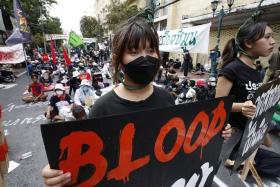Apec to move ahead with TPP without US
TPP countries in Hanoi for Asia-Pacific Economic Cooperation forum
HANOI Japan and other members of the Trans-Pacific Partnership (TPP) agreed yesterday to pursue their trade deal without the United States, as the Trump administration's "America First" policy created tension at a meeting of Asia-Pacific countries.
Turmoil over trade negotiations was laid bare at a meeting of the Asia-Pacific Economic Cooperation (Apec) forum, which failed to agree on its usual joint statement after US opposition to wording on free trade and fighting protectionism.
The meeting in Hanoi, Vietnam, was the biggest global trade gathering since US President Donald Trump upended the old order, arguing that multilateral free-trade agreements were costing US jobs and that he wanted to cut new deals.
On the sidelines of the meeting, the 11 remaining countries of the TPP agreed to explore how they could move ahead without the US - partly in the hope that Washington would reconsider leaving.
"Singapore supports the joint efforts by the 11 to sustain the TPP," said Minister for Trade and Industry Lim Hng Kiang.
"It is important that we keep up momentum. Singapore will participate constructively in this collective process to harvest the TPP's benefits."
New US Trade Representative Robert Lighthizer said there was no way back.
"I believe at some point there will be a series of bilateral agreements with partners in this part of the world," the 69-year-old Reagan-era trade negotiator told a news conference.
"Bilateral negotiations are better for the United States."
Although the TPP members kept the trade agreement alive, they fell short of a wholehearted commitment to advance immediately with a deal that members also see as a way to contain an increasingly dominant China.
"We're focused on how we can move ahead with 11 countries," New Zealand Trade Minister Todd McClay said.
One of the biggest challenges is keeping on board Vietnam and Malaysia, which signed up for the deal and promised to make major reforms largely to get better US market access.
"We will need to ensure that our interests remain protected and the benefits derived from it still outweigh the costs," Malaysian Trade Minister Mustapa Mohamed said.
The volume of trade among the remaining countries is barely a quarter of the level it would have been if the US had remained in the TPP.
Officials from TPP countries will meet again in Japan in July and bring proposals in November, Mr McClay said.
Fears of protectionism have grown under the Trump presidency and the failure of the Asia-Pacific countries to agree on their usual joint statement did nothing to quell them.
The US was against wording agreed to by the other 20 Apec countries that supported free trade and opposed protectionism, officials at the talks said.
A statement from the Vietnamese chairman of the talks gave a "commitment to promote trade and investment liberalisation".
But the only announcement from all members was an "Actions Statement" that contained no such commitments.
Explaining US opposition to the word "protectionism", Mr Lighthizer said it was being confused with the stepsneeded to promote free trade.
He said: "Our view is that we want free trade, we want fair trade, we want a system that leads to greater market efficiency throughout the world." - REUTERS
Get The New Paper on your phone with the free TNP app. Download from the Apple App Store or Google Play Store now


